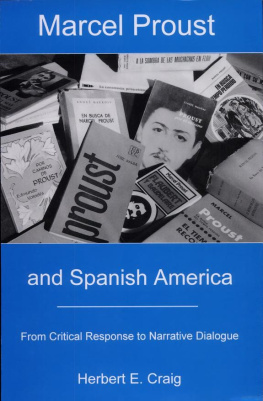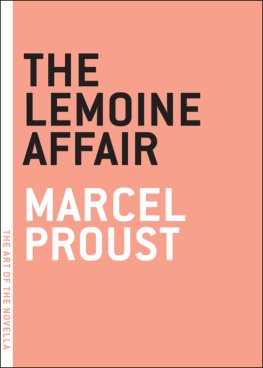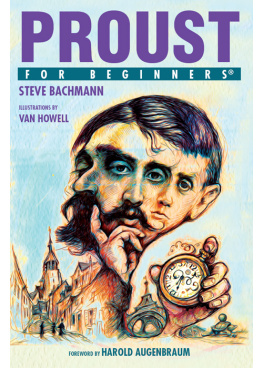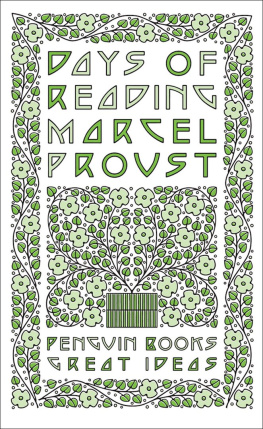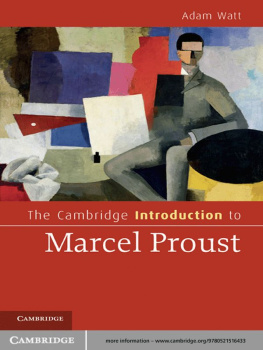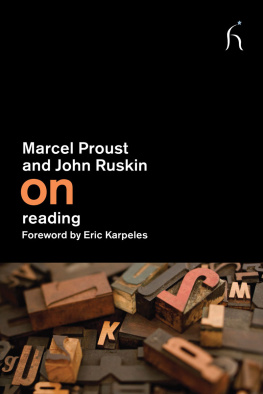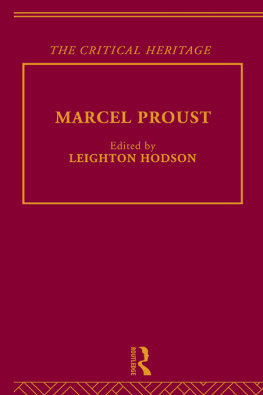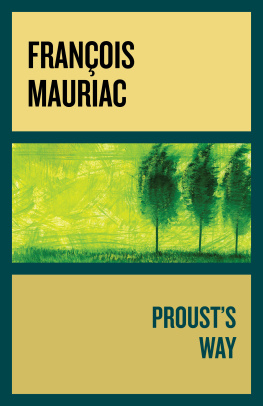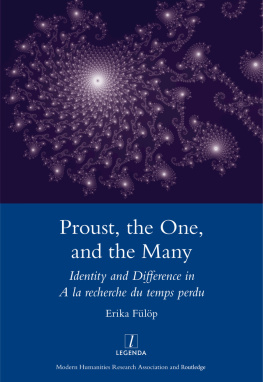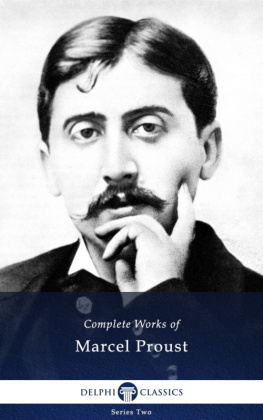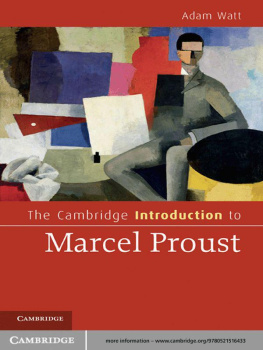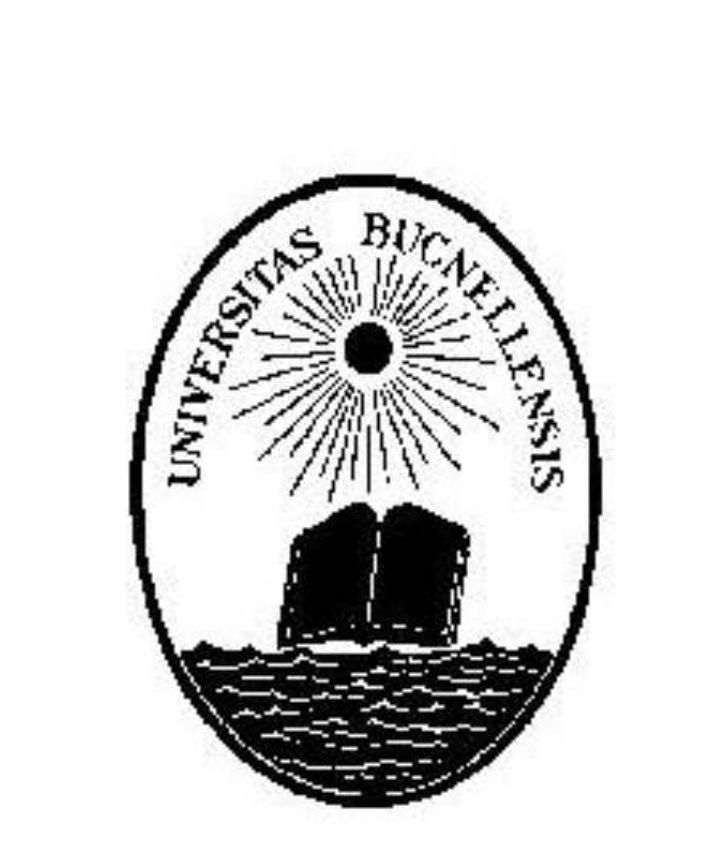Manuel Mujica Linez in his home, photographed in front of a sketch of Proust.
Marcel Proust and Spanish America
From Critical Response to Narrative Dialogue
Herbert E. Craig
Lewisburg Bucknell University Press London: Associated University Presses
2002 by Rosemont Publishing and Printing Corp.
All rights reserved. Authorization to photocopy items for internal or personal use, or the internal or personal use of specific clients, is granted by the copyright owner, provided that a base fee of $10.00, plus eight cents per page, per copy is paid directly to the Copyright Clearance Center, 222 Rosewood Drive, Danvers, Massachusetts 01923. [0-8387-5485-6/02 $10.00 + 8 pp, pc. ]
Associated University Presses 440 Forsgate Drive Cranbury, NJ 08512
Associated University Presses 16 Barter Street London WC1A 2AH, England
Associated University Presses P.O. Box 338, Port Credit Mississauga, Ontario Canada L5G 4L8
The paper used in this publication meets the requirements of the American National Standard for Permanence of Paper for Printed Library Materials Z39.481984.
Library of Congress Cataloging-in-Publication Data Craig, Herbert E. Marcel Proust and Spanish America: from critical response to narrative dialogue / Herbert E. Craig. p. cm. Includes bibliographical references and index. ISBN 0-8387-5485-6 (alk. paper) 1. Proust, Marcel, 18711922AppreciationLatin America. 2. Proust, Marcel, 18711922Influence. 3. Latin American literatureFrench influences. 4. Latin American literature20th centuryHistory and criticism. I. Title. PQ2631.R63 Z5459865 2002 843.912dc21
2001043738
PRINTED IN THE UNITED STATES OF AMERICA
To the Proustians: who read and discussed the Recherche with fervor, like Victoria Ocampo of Argentina or Yolanda Oreamuno of Costa Rica, who wrote numerous articles on Marcel Proust, like Alone of Chile or Edmundo Valads of Mexico, who wrote novels as well as critical studies, like Jaime Torres Bodet of Mexico, Alejo Carpentier of Cuba, Jos Bianco of Argentina or Eduardo Caballero Caldern of Colombia, who wrote long novels related to the Recherche, like Manuel Mujica Linez of Argentina, Jos Donoso of Chile, Alfredo Bryce Echenique of Peru or Reinaldo Arenas of Cuba, who studied the Recherche in depth and taught it, like Germaine Bre in Wisconsin or Philip Kolb in Illinois.
[This page intentionally left blank.] |
|
| Going Beyond the Psychological Novel during and since the Boom |
| 5. On Art, Artists and their Admirers: A l'ombre des artistes en fleurs in Spanish America |
| Music and Art in the Novel: Impressionist Descriptions and the Life of an Artist |
| Updated Interpretations of Art and the Artist: Rayuela and Its Followers |
| Mature Writers in the Novel |
| 6. On Lost Time and the Search for It: Spiritual Equivalents of Combray and Albertine disparue |
| Childhood as a Lost Paradise |
| The Loss of a Beloved and Attempts at Recovery |
| Time as Change and as a Destructive Force |
| A Culmination of the Themes of Time in the Work of Gabriel Garca Mrquez |
| 7. On Involuntary Memory: From Applying the Lessons of Le temps retrouv to Dialoguing with Them |
| Learning How to Integrate Proustian Memory into a Narrative Structure |
| Proustian Memory and Bourgeois Sensuality (19551970) |
| Four Extended Narrative Dialogues on Searching for the Past and for Wholeness |
| 8. On Becoming a Writer: Following Proust's Way from Combray to Le temps retrouv |
| Achieving Success in Writing (and Reading) |
| Notebooks Written in Paris |
| Narrative Confrontations with Failure |
| Final Remarks: From Attention to Detail to the Creation of Vast Syntactical and Narrative Structures for a New Poetic Vision |
| Notes |
| A Bibliography of Marcel Proust in Spanish America |
| Texts by Marcel Proust in Translation |
| Literary Criticism of Proust's Work Written or Published in Spanish America |
| Studies on Literary or Personal Relations between Proust and Spanish Americans |
| Poems, Plays, Pastiches, and Parodies about Proust |
| Testimonials and Other Texts which Demonstrate a Personal Interest in Proust |
| Works Cited |
| Literary Works and Memoirs |
| Critical Studies |
| Index |
-8-
Acknowledgements
I WOULD LIKE TO THANK ALL OF THE AUTHORS WHOSE WORKS I HAVE cited, but most particularly those for which I needed to request special permission: Rayuela by Julio Cortzar, El recurso del mtodo by Alejo Carpentier, and Abaddn el exterminador by Ernesto Sbato. These were received through the Agencia Literaria Carmen Balcells, S. A. (Barcelona), the Fundacin Alejo Carpentier (Havana), and the Agencia Literaria Guillermo Schavelzon & Asociados (Buenos Aires), respectively.
-9-
[This page intentionally left blank.] |
|
[This page intentionally left blank.] |
|
Point of Departure: An Intimate Conversation between an Aspiring French Writer and a Young Pianist Born in Venezuela
AMONG THE READERS AND SCHOLARS OF A la recherche du temps perdu [In Search of Lost Time], it is a well-known fact that the art song and opera composer, Reynaldo Hahn (1874 1947), was one of Marcel Proust's most intimate friends. Such Proustians are fully aware of the fact that two years before the publication of Les plaisirs et les jours [Pleasures and Days](1896) its then unknown author met the nineteen-year-old pianist at the salon of Madeleine Lemaire, and the two young men began a spiritual and physical relationship that would last nearly thirty years, until Proust's death on 18 November 1922. They may also realize that Reynaldo, who was the only person outside of Marcel's family and domestic staff permitted to enter the dying man's bedroom, had been born in Caracas, Venezuela. But, they have little, if any, knowledge of the literary relation between Proust and the Spanish-speaking world, where the composer of L'Heure exquise [The Exquisite Hour] and Ciboulette spent his early years.
On the other hand, even though the readers and scholars of Spanish American literature may have heard that, like other modernist writers, Proust had a profound effect upon many of the novels of the Boom, they generally have no awareness of Reynaldo Hahn or of Proust's acquaintance with other Spanish Americans (e.g., the Argentine writer-diplomat Lucio V. Mansilla). Nor do they have a clear understanding of how, when, or where the Recherche was introduced into the New World, or in what way this literary relation has developed over time. The purpose of this study will be to enlighten both types of readers and scholars so that they can have a detailed knowledge of this very important personal and literary relation.
Indeed a few scholars and writers have carefully examined the friendship between Marcel Proust and Reynaldo Hahn. Philip Kolb published their letters in 1956, and this expert on Proust's correspondence and

